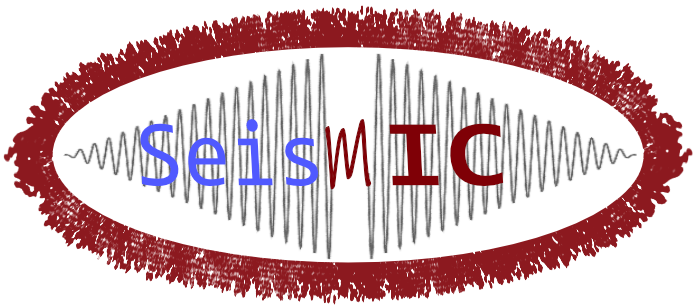Source code for seismic.utils.raw_analysis
'''
Module for waveform data analysis. Contains spectrogram computation.
:copyright:
The SeisMIC development team (makus@gfz-potsdam.de).
:license:
EUROPEAN UNION PUBLIC LICENCE Version 1.2
(https://joinup.ec.europa.eu/collection/eupl/eupl-text-eupl-12)
:author:
Peter Makus (makus@gfz-potsdam.de)
Created: Wednesday, 21st June 2023 12:22:00 pm
Last Modified: Thursday, 31st August 2023 04:40:30 pm
'''
from typing import Iterator
import warnings
from mpi4py import MPI
import numpy as np
from obspy import Stream, Trace
from scipy.signal import welch
from scipy.interpolate import pchip_interpolate
from seismic.utils.miic_utils import resample_or_decimate
[docs]def spct_series_welch(
streams: Iterator[Stream], window_length: int, freqmax: float,
remove_response: bool = True):
"""
Computes a spectral time series. Each point in time is computed using the
welch method. Windows overlap by half the windolength. The input stream can
contain one or several traces from the same station. Frequency axis is
logarithmic.
.. note::
MPI support since version 0.4.2. Then the result is only
available on rank 0. All other ranks return None. (to save RAM)
:param st: Input Stream with data from one station.
:type st: ~obspy.core.Stream
:param window_length: window length in seconds for each datapoint in time
:type window_length: int or float
:param freqmax: maximum frequency to be considered
:type freqmax: float
:return: Arrays containing a frequency and time series and the spectral
series.
:rtype: np.ndarray
"""
comm = MPI.COMM_WORLD
rank = comm.Get_rank()
psize = comm.Get_size()
specl = []
# List of actually available times
t = []
for ii, st in enumerate(streams):
# Find out which stream to process
if ii % psize != rank:
continue
try:
# Don't preprocess masked values
tr = Stream(
[preprocess(
tr,
freqmax,
remove_response) for tr in st.split()]).merge()[0]
except IndexError:
warnings.warn('No data in stream for this time step.')
continue
except Exception as e:
warnings.warn(
'Error while preprocessing stream. Skipping... Message: '
f'{e}')
continue
for wintr in tr.slide(window_length=window_length, step=window_length):
try:
f, S = welch(wintr.data, fs=wintr.stats.sampling_rate)
# interpolate onto a logarithmic frequency space
# 512 points of resolution in f direction hardcoded for now
f2 = np.logspace(-3, np.log10(f.max()), 512)
S2 = pchip_interpolate(f, S, f2)
specl.append(S2)
t.append(wintr.stats.starttime)
except Exception as e:
warnings.warn(
'Error while computing welch spectrum for time window: '
f'{wintr.stats.starttime}. Skipping... Message: {e}')
continue
# Gather all the data
specl = comm.gather(specl, root=0)
t = comm.gather(t, root=0)
if rank == 0:
# Flatten the list
specl = [item for sublist in specl for item in sublist]
t = [item for sublist in t for item in sublist]
# Sort from values in t
specl = [x for _, x in sorted(zip(t, specl))]
t = sorted(t)
# Convert to numpy array
S = np.array(specl)
t = np.array(t)
try:
return f2, t, S.T
except UnboundLocalError:
raise ValueError(
'A spectrum could not be computed. Check earlier log messages')
else:
return None, None, None
[docs]def preprocess(tr: Trace, freqmax: float, remove_response: bool):
"""
Some very basic preprocessing on the string in order to plot the spectral
series. Does the following steps:
*1. Remove station response*
*2. Detrend*
*3. Decimate if sampling rate>50*
*4. highpass filter with corner period of 300s.*
:param st: The input Stream, should only contain Traces from one station.
:type st: ~obspy.core.Stream
:return: The output stream and station inventory object
:rtype: ~obspy.core.Stream and ~obspy.core.Inventory
"""
# Downsample to make computations faster
resample_or_decimate(tr, freqmax*2)
if remove_response:
# Remove response
tr.remove_response()
# Detrend
tr.detrend(type='linear')
# highpass filter
tr.filter('highpass', freq=0.01)
return tr
